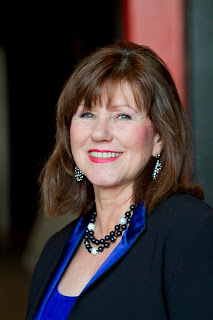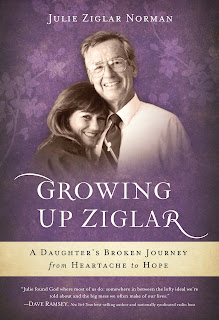Growing Up Ziglar: A Daughter’s Broken Journey from Heartache to Hope
An interview with Julie Ziglar Norman, author of Growing Up Ziglar
Julie Ziglar Norman often says her dad is the king of
“doing life right” and she is the poster child for “doing life wrong.” In Growing
Up Ziglar: A Daughter’s Broken Journey from Heartache to Hope, Norman shares how for 25 years she
lived every day with regret, shame, guilt, and
depression while trying to keep up the positive outer appearance that was
expected of her as the daughter of popular motivational author and speaker Zig
Ziglar.
Q: What was it like growing up as
Zig Ziglar’s daughter?
My dad was not famous most of the years I
spent growing up. He was a salesman
working on straight commission so he traveled a lot. Dad was (and still is) a good father. He always gave it his best effort. He taught me to obey the law, tell the truth
and work hard, but he didn’t become a Christian until I was a few weeks shy of
being seventeen years old. Until then, Dad couldn’t have known everything he
needed to be teaching me.
When I talk about what it was
like growing up with Mr. Positive Attitude himself, I enjoy teasing about
waking up to an “opportunity clock” instead of an alarm clock. I point out that most families look forward
to the weekend; not the Ziglar family, we looked forward to the “strong
end.” When we got the sniffles we had a
“warm,” not a cold. Daddy was always
positive and looked on the bright side and he brought lots of joy and laughter
into our home. He was a fun and loving
father who always had a good story and lots of hugs and kisses for his
children.
Q: Growing Up Ziglar actually focuses more on the struggles that
started as a teen and young adult than stories of growing up. You battled
depression and alcohol among other things. What do you think led you down the
road of negativity, when you grew up in a background that expressed positivity?
I
made bad choices that led to negative consequences. My choices were based on my immature,
thirteen-year-old desire to “belong and fit-in” when our family moved from
Columbia, South Carolina to Dallas, Texas.
The process was complicated by a jealous classmate who started a rumor
about me that was so bad that I ultimately earned a bad reputation that I had
wrongly been given. I wasn’t actually a
rebellious child, at least not openly. I
was a people pleaser of the worst sort and that, I believe, caused the majority
of my problems.
I struggled with being too independent. I would not ask for help when I needed it and
I never let anyone know when I was hurting or when my life was getting out of
control. Learning to be Inter-dependent
involved letting go of the fear of judgment, letting go of being prideful, and
facing the knowledge that I’d feel rejected if I asked for help and didn’t
receive any. Being transparent makes you
vulnerable and when your opinion of yourself is low to start with it makes one
resistant to risk taking.
I also struggled with totally
surrendering my life to Christ. I was so
afraid of what He’d require of me.
I struggled with using alcohol,
food, and men to change the way I felt.
I used to think that changing where I lived would change my life. That makes me laugh at myself now but I
believe many things to be true that simply were not true.
I also struggled with not
understanding God’s grace and His total forgiveness. Because of that misperception I lived outside
of His will for two decades longer than I had to.
Q: The primary message of your
book is that there is hope in Christ. What encouragement would you offer to
someone who believes that they’ve made so many mistakes that their situation is
hopeless?
I would share with them the
promises of God and tell them I, too, felt hopeless but the truth set me wildly
free. Then I would share how the
following verse has shown me that all my junk, the messes of my life, are used
by God to comfort others…even them and that God will comfort them and use them
for His glory, if they will only let Him.
“Blessed be the God and Father of
our Lord Jesus Christ, the Father of mercies and God of all comfort, who
comforts us in all our tribulation, that we may be able to comfort those who
are in any trouble, with the comfort with which we ourselves are comforted by
God.” NKJV
Q: You now lead the Ziglar Women’s
conference. What is the primary
objective of your conference?
The
Ziglar Women include my mother Jean Ziglar, my oldest daughter DeDe Galindo, my
youngest daughter Amey Fair and me. The objective or
mission of The Ziglar Women is to challenge tentative Christianity, inspire
God’s people to intensify their personal relationship with Jesus Christ and to
become a light in the darkness for those who seek God.
We teach women about shredding
the veil of false pretense and learning how to live comfortably in their own
skin because Jesus loves them right where they are. We call women to get
real, and thus get right with God and the people they share their lives with.
The conference is about real life in the trenches, coming to terms with
unspeakable sins, and the sickness that engulfs those who live with
secrets.
For the Christian who has cleaned
up her life but shamefully hides her past, we want her to know that she lives
in bondage still. Our point is that if
women hide their wrongs they are not free to help other women who are in the
midst of their wrongs find a way out. There is no counsel like the
counsel of one who has walked your path.
Christian women more than any
other group I am familiar with hide the truth of what God has so graciously
forgiven them because of shame they shouldn't even have in their lives
anymore. Our conference is about gut-wrenching repentance, getting past
shame, guilt, remorse and regret and using your hellish past, or if you're the
more positive type, using your experience, strength and hope, to glorify God
and comfort others.
(Guideposts/May 1, 2012/ISBN
978-0-8249-4531-2/$14.99)


Comments